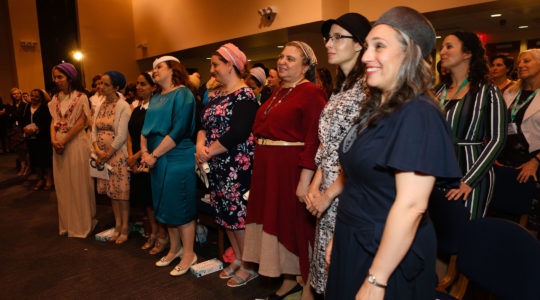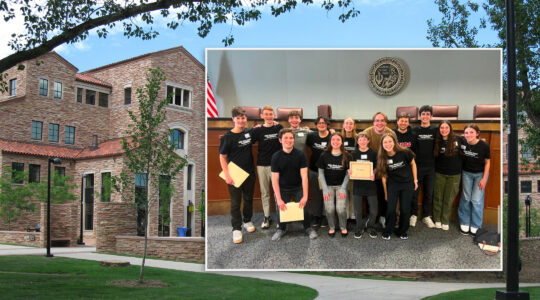Remember the immigration debate? That was the thing that got thousands of people to crowd airports to protest the president’s “Muslim ban”; that stirred horror over images of migrant children separated from their families; that arguably led to Trump’s election thanks to promises to “build that wall.”
The issue is currently on the back burner, like so many hot and vital topics crowded out by coverage of the impeachment, the crisis at the Justice Department, the panic over the coronavirus and the car crash that is the Democratic primaries.
But there have been significant developments on the immigration front in recent days, including two important cases that put Jewish groups and activists front and center.
Last month a federal judge temporarily suspended a new Trump administration policy that allowed state and local authorities to opt out of receiving refugees. The case, HIAS v. Trump, was brought by the venerable Jewish immigration society along with two Christian groups.
And earlier this month, a settlement was reached in a case, Jewish Family Services (of Seattle) v. Trump, requiring the federal government to expedite the processing of more than 300 refugees who were part of a class-action suit. HIAS was involved in that one too.
In both cases, the immigration rights groups were advocating for refugees; refugees, I should remind you, are persons who face a “well-founded fear of persecution” in their home countries and are thoroughly vetted before being allowed to resettle in the United States. The White House doesn’t think America can handle many refugees, any more than we can immigrants or asylum-seekers: Since taking office, Trump has capped the number of refugees admitted at 18,000 a year, down from President Obama’s limit of 110,000 during his last year in office.
It’s against this backdrop that groups like HIAS and T’ruah and the local Jewish Family Services that take in refugees are invoking Jewish history and values in advocating for more generous and humanitarian immigration policies. The Jewish Council for Public Affairs regularly asks to expand the U.S. refugee resettlement cap. Groups that once focused on Jewish migrants and refugees have shifted, with no dispersed Jews to save, to helping others who could benefit from their accumulated experience and expertise.
Someone who embodies this shift is Becca Heller, co-founder and executive director of the International Refugee Assistance Project, a nonprofit that provides legal assistance to refugees and displaced persons. IRAP argued successfully on behalf of the plaintiffs in JFS v. Trump. They were also plaintiffs’ attorneys in HIAS v. Trump.
Heller won a MacArthur “genius” fellowship for her work; significantly, she won the 2015 Charles Bronfman Prize, given to those under the age of 50 whose “innovative work, fueled by their Jewish values, has significantly improved the world.”
Heller was in law school and doing a fellowship in Israel when she travelled to Jordan, where Iraqi refugees had fled following the upheavals of the U.S.-led war back home. There, she told me this week, she learned about the “arbitrariness inherent in the whole process” of resettlement, and asked how the system could be “more respectful, humane and fair.” Heading back to Yale Law, she founded the student organization that became IRAP, offering pro bono help to refugees and asylum-seekers.
Thirty years ago she might have been working on Soviet Jewry; 80 years ago, on rescuing Jews from Nazi-occupied Europe. Today her clients are from El Salvador, Honduras, Guatemala, Somalia, Syria, Afghanistan and Iraq.
Her work, she says, is both deeply American and deeply Jewish.
“Our responsibility to take in refugees is a significant and pretty basic principle of our democracy, given that the U.S. was founded on the principle of taking in people from other countries who couldn’t live there. They couldn’t practice their religion the way they wanted to in England, which is almost the definition of a refugee,” she said, speaking of the early settlers. “I think that in spite of various waves of xenophobia” – she mentions the Chinese Exclusion Act of 1882, the internment of Japanese during World War II and the exploitation of seasonal agricultural workers – “we have more or less managed to stick to that over 200 years, until this administration not only doesn’t want to take them but punishes them for showing up at the border.”
As for her Jewish self, “This is deeply personal for me,” she says. She can’t fill in her family tree before 1935, “when everything was wiped out. My uncle went back to the town in Lithuania where we were from and it doesn’t exist.” Citizenship, she notes, is an accident of birth. “What if I had been born in 1925 in Warsaw? Any Jewish person knows it could happen to us and did happen to us. What if I hadn’t been born in Northern California in 1981? I am paying it forward for people who weren’t as lucky as me.”
I know that immigration reform and refugee resettlement are not universally popular in the current Jewish world. Critics contend that community resources are better spent on specifically Jewish populations, here and in Israel. Or they agree with the administration that limiting newcomers, especially from the Muslim world, is a matter of public safety and economic common sense.
But just as the American Jewish experience is largely an immigrant experience, the history of Jewish activism has left us with a rich bank of expertise and empathy. Cases inspired by this legacy may make their way quietly through the court system, but they speak loudly to what a community can and should stand for.
The New York Jewish Week brings you the stories behind the headlines, keeping you connected to Jewish life in New York. Help sustain the reporting you trust by donating today.





